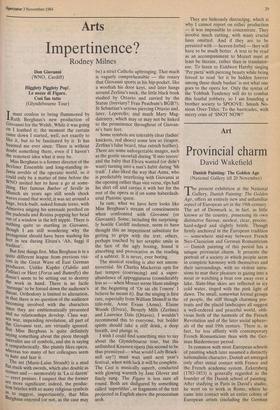Arts
Impertinence?
Rodney Milnes
Don Giovanni (WNO, Cardiff) Higglety Pigglety Pop!, Le nozze di Figaro, Cosi fan tutte (Glyndebourne Tour)
Imust confess to being flummoxed by Ruth Berghaus's new production of Giovanni for the Welsh.. While it was going on I loathed it; the moment the curtain came down I started, well, not exactly to like it, but to be fascinated by it. It has haunted me ever since. There is without doubt something there, even if I haven't the remotest idea what it may be.
Miss Berghaus is a former director of the Berliner Ensemble and long-standing in- fanta terrible of the operatic world, so it could only be a matter of time before the WNO invited her to have a go at some- thing. Her famous Barber of Seville in Munich six years ago still sends shock Waves round that world; it was set around a huge, brick-built, naked female torso, with Almaviva singing his serenade perched on the pudenda and Rosina popping her head out of a window in the left nipple. There is nothing quite so startling in Giovanni, though I am still wondering why the Protagonist should have been washing his feet in tea during Elvira's 'Ah, fuggi ii traditor'.
But first things first. Miss Berghaus is in a quite different league from previous visi- tors in the Great Wave of East German producers. Unlike Kupfer (Fidelio and Pelleas) or Herz (Forza and Butterfly) she doesn't seem to be setting out to destroy the work in hand. There is no facile Message' to be forced down the audience's throat. Orthodoxy is limited to alienation, In that there is no question of the audience becoming involved with the characters since they are emblematically presented and no relationships develop. Class war, sex war, impending revolution, all part of the Giovanni text, are virtually ignored. But Miss Berghaus is quite definitely saying something about the piece through surrealist use of symbols,. and she is saying
sYmpathetically. She plainly likes opera, Whereas too many of her colleagues seem to hate and fear it.
The set (Marie-Luise Strandt) is a mud flat stuck with swords, which also double as crosses and — memorably in `La ci darem' erect penises. I suspect that the former are more significant; indeed, the produc- tion bristles with so many religious symbols as to suggest, impertinently, that Miss Berghaus enjoyed (or not, as the case may
be) a strict Catholic upbringing. That much is vaguely comprehensible — the rosary that Giovanni sports in his hip-pocket, like a wooftah his door keys, and later hangs around Zerlina's neck; the little black book studied by Ottavio and carried by the Statue (breviary? Frau Peachum's BGB?); St Sebastian's arrows piercing Ottavio and, later, Leporello; and much Mary Mag- dalenery, which may or may not be linked to the prominence throughout of Giovan- ni's bare feet.
Some symbols are tolerably clear (ladies' knickers, red shoes) some less so (teapot, Zerlina's false beard, blue ostrich feather). There are some unforgettable images, such as the gentle snowfall during 'II mio tesoro' and the baby that Elvira wanted (or didn't want) turning into a nun's habit during `Mi tradi'. I also liked the way that Anna, who is predictably interfering with Giovanni at the opening rather than vice versa, rips half his shirt off and carries it with her for the rest of the opera as if on some haberdash- erial Platonic quest.
In sum, what we have here looks like Miss Berghaus's stream of consciousness when confronted with Giovanni (or Giovanni). Some, including the surprising- ly hostile Cardiff audience, seem to have thought this an impertinent substitute for getting to grips with the text; others, perhaps touched by her seraphic smile in the face of the ugly booing, found it absorbing and provocative as the reading of a subtext. It is never, ever boring.
The musical reading is also not uncon- troversial. Sir Charles Mackerras opts for fast tempos (convincing) and a super- abundance of appoggiaturas (considerably less so — when Mozart wrote blunt endings at the beginning of 'Or sai chi l'onore' I believe he meant it). But the singing is first rate, especially from William Shimell in the title-role, Anne Evans (Anna), Elaine Woods (Elvira), Beverly Mills (Zerlina) and Laurence Dale (Ottavio). I wouldn't recommend this to everyone, but bolder spirits should take a stiff drink, a deep breath, and plunge in.
I wish I could find something nice to say about the Glyndebourne tour, but the unfinished Knussen opera (his second to be thus premiered – - what would Lady Brack- nell say?) must wait until next year's festival, when with luck it will be complete. The Cosi is musically superb, conducted with glowing warmth by Jane Glover and finely sung. The Figaro is less sure all round. Both are disfigured by something called `supertitles', or fragments of the text projected in English above the proscenium arch.
They are hideously distracting, which is why I cannot report on either production — it was impossible to concentrate. They involve much cutting, with many crucial lines omitted. And if they are to be persisted with — heaven forbid — they will have to be much better. A text to be read as an accompaniment to Mozart must at least be literate, rather than in translator- ese. To listen to Eiddwen Harrhy singing 'Per pieta' with piercing beauty while being forced to read let it be hidden forever among these shady bushes' is not what one goes to the opera for. Only the syntax of the Yobbish Tendency will do to combat this fearful yobbery, so I am founding a brother society to SPOOVE: Smash No- xious Over-Titles. To the barricades, with merry cries of 'SNOT NOW!'










































 Previous page
Previous page